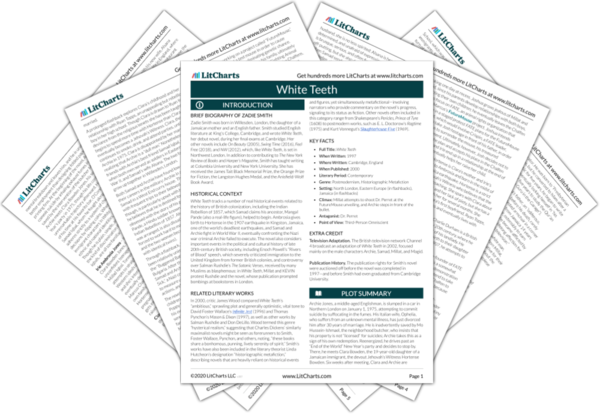Irie Ambrosia Jones Quotes in White Teeth
It worked like this: someone (whoever had actually bought a pack of fags) lights up. Someone shouts “halves.” At the halfway point the fag is passed over. As soon as it reaches the second person we hear “thirds,” then “saves” (which is half a third), then “butt!,” then, if the day is cold and the need for a fag overwhelming, “last toke!” But last toke is only for the desperate; it is beyond the perforation, beyond the brand name of the cigarette, beyond what could reasonably be described as the butt. Last toke is the yellowing fabric of the roach, containing the stuff that is less than tobacco, the stuff that collects in the lungs like a time bomb, destroys the immune system, and brings permanent, sniffling, nasal flu. The stuff that turns white teeth yellow.

Unlock explanations and citation info for this and every other White Teeth quote.
Plus so much more...
Get LitCharts A+All in all, then, the headmaster was wrong: Glenard could not be said to have passed on any great edifying beacon to future generations. A legacy is not something you can give or take by choice, and there are no certainties in the sticky business of inheritance. Much though it may have dismayed him, Glenard’s influence turned out to be personal, not professional or educational: it ran through people’s blood and the blood of their families; it ran through three generations of immigrants who could feel both abandoned and hungry even when in the bosom of their families in front of a mighty feast; and it even ran through Irie Jones of Jamaica’s Bowden clan, though she didn’t know it.
The Chalfens had no friends. They interacted mainly with the Chalfen extended family (the good genes that were so often referred to; two scientists, one mathematician, three psychiatrists, and a young cousin working for the Labour Party) […] Bottom line: the Chalfens didn’t need other people. They referred to themselves as nouns, verbs, and occasionally adjectives: It’s the Chalfen way, And then he came out with a real Chalfenism, He’s Chalfening again, We need to be a bit more Chalfenist about this. Joyce challenged anyone to show her a happier family, a more Chalfenist family than theirs.
O what a tangled web we weave. Millat was right: these parents were damaged people, missing hands, missing teeth. These parents were full of information you wanted to know but were too scared to hear. But [Irie] didn’t want it anymore, she was tired of it. She was sick of never getting the whole truth. She was returning to sender.

Irie Ambrosia Jones Quotes in White Teeth
It worked like this: someone (whoever had actually bought a pack of fags) lights up. Someone shouts “halves.” At the halfway point the fag is passed over. As soon as it reaches the second person we hear “thirds,” then “saves” (which is half a third), then “butt!,” then, if the day is cold and the need for a fag overwhelming, “last toke!” But last toke is only for the desperate; it is beyond the perforation, beyond the brand name of the cigarette, beyond what could reasonably be described as the butt. Last toke is the yellowing fabric of the roach, containing the stuff that is less than tobacco, the stuff that collects in the lungs like a time bomb, destroys the immune system, and brings permanent, sniffling, nasal flu. The stuff that turns white teeth yellow.

Unlock explanations and citation info for this and every other White Teeth quote.
Plus so much more...
Get LitCharts A+All in all, then, the headmaster was wrong: Glenard could not be said to have passed on any great edifying beacon to future generations. A legacy is not something you can give or take by choice, and there are no certainties in the sticky business of inheritance. Much though it may have dismayed him, Glenard’s influence turned out to be personal, not professional or educational: it ran through people’s blood and the blood of their families; it ran through three generations of immigrants who could feel both abandoned and hungry even when in the bosom of their families in front of a mighty feast; and it even ran through Irie Jones of Jamaica’s Bowden clan, though she didn’t know it.
The Chalfens had no friends. They interacted mainly with the Chalfen extended family (the good genes that were so often referred to; two scientists, one mathematician, three psychiatrists, and a young cousin working for the Labour Party) […] Bottom line: the Chalfens didn’t need other people. They referred to themselves as nouns, verbs, and occasionally adjectives: It’s the Chalfen way, And then he came out with a real Chalfenism, He’s Chalfening again, We need to be a bit more Chalfenist about this. Joyce challenged anyone to show her a happier family, a more Chalfenist family than theirs.
O what a tangled web we weave. Millat was right: these parents were damaged people, missing hands, missing teeth. These parents were full of information you wanted to know but were too scared to hear. But [Irie] didn’t want it anymore, she was tired of it. She was sick of never getting the whole truth. She was returning to sender.











